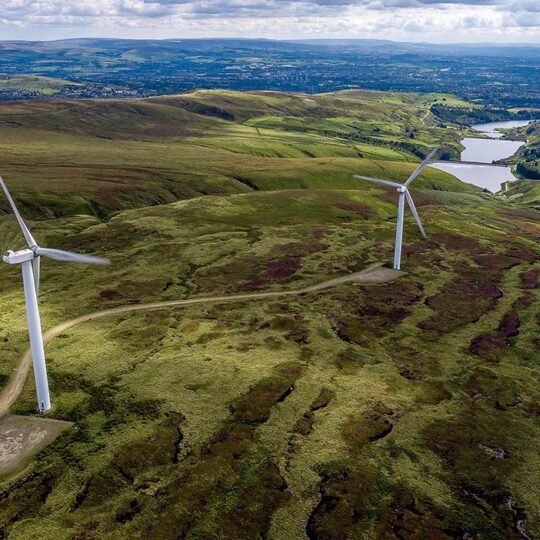NIA2: Impact so far
Review of the policy impacts already made by recommendations in the second National Infrastructure Assessment.
The second National Infrastructure Assessment, published in October 2023, set out a comprehensive long term plan for infrastructure renewal and upgrades to support key economic and environmental goals.
The Commission has since presented its analysis and recommendations to dozens of industry bodies and public sector organisations and has engaged in a substantial number of private meetings with Ministers, MPs and Peers, and government officials on the details of NIA2.
The Commission’s recommendations are already having an impact. Recent government announcements have reflected the Commission’s thinking and cited the Commission’s analysis, even before government’s full formal response to the Assessment which is expected alongside an updated National Infrastructure Strategy in 2024. Selected examples of this impact are highlighted below.
Planning reform
Government announced a suite of reforms to the planning system for nationally significant infrastructure projects (NSIPs) alongside the Autumn Statement in November 2023. These reforms were announced in response to the Commission’s study on this topic published in April 2023, the recommendations of which were reiterated in NIA2.
The Commission’s proposals included five-yearly reviews of National Policy Statements; a clear menu of direct benefits for communities hosting major infrastructure schemes; a central coordination and oversight mechanism for NSIPs reporting to the Prime Minister or the Chancellor; and the introduction of an environmental data sharing platform by the end of 2024, with the establishment of a library of effective environmental mitigations for different kinds of infrastructure by the end of 2025.
Government’s response accepted the first three principles but did not fully adopt the Commission’s recommendations on environmental assessments.
The Commission was also encouraged to note the designation of updated NPSs for energy in January 2024 and for national transport networks at the Spring Budget 2024. Regular updating of NPSs was a key Commission recommendation.
More widely, government has endorsed the need for a strategic spatial approach to energy transmission networks, recommended by Commissioner Nick Winser in his independent report on accelerating transmission network deployment and echoed in NIA2.
Hydrogen and CCS networks
On 14 December 2023, government announced plans for eleven new projects for hydrogen production in the UK alongside updates to its existing strategy for the development of hydrogen manufacturing.
In addition, the government published an updated delivery plan for its existing hydrogen strategy, a ‘vision’ document for hydrogen transportation and storage including details of proposed business models that will be used to boost production.
These documents adopted many of the Commission’s recommendations in NIA2, such as the creation of a core hydrogen network connecting industrial hubs, a consultation on the right mechanisms to support the early deployment of hydrogen power generation and storage, and a commitment to consider the need for a strategic energy reserve.
Heat pumps
Government’s December 2023 commitment to increase future funding (from 2025) for the Boiler Upgrade Scheme reflects the Commission’s strong support for electrification as the answer for the future of home heating. While the Commission believes greater public funding will be required to support many millions of homeowners to make the switch, government’s initial move to expand the reach of the scheme is a welcome step in the right direction.
Transport
Government’s Network North plan (published shortly before NIA2) seeks to focus spending previously earmarked for the later phases of HS2 to other projects, including local transport and roads maintenance.
While the Commission did not support the decision to cancel HS2 linking Birmingham and Manchester, NIA2 did recommend that funding for local transport be significantly increased. Government has since announced significant additional funding to be provided through City Region Sustainable Transport Settlements (CRSTS). If this level of funding was to be maintained for the next twenty years, it would broadly match the level of increased investment in local public transport recommended in NIA2. Government has also committed to significantly increase investment in local road maintenance, which is line with the priority given to road maintenance in NIA2.
The Commission’s view is that investment is required to improve both local and inter-city transport at the same time. This is why we have called for a comprehensive, long term and fully costed plan that sets out how rail improvements will address the capacity and connectivity challenges facing city regions in the North and Midlands, in addition to the welcome increase in CRSTS spending.
Waste
At Spring Budget 2024, government announced that landfill tax rates will be adjusted to better reflect inflation rates and to incentivise investment in more sustainable waste management infrastructure. This directly reflects the Commission’s call in NIA2 for this tax to be increased to ensure it remains the most expensive treatment option for residual waste.
The Commission will continue to make the case for its recommendations and will monitor government’s responses, in particular through the Infrastructure Progress Review 2024 to be published on 16 May.

Status: Completed
Second National Infrastructure Assessment
Our thirty year plan for a low carbon and resilient economy that supports economic growth and protects the natural environment
Reports & StudiesDesign & Funding Digital & Data Energy & Net Zero Environment National Infrastructure Assessment Place Regulation & Resilience Transport Water & Floods